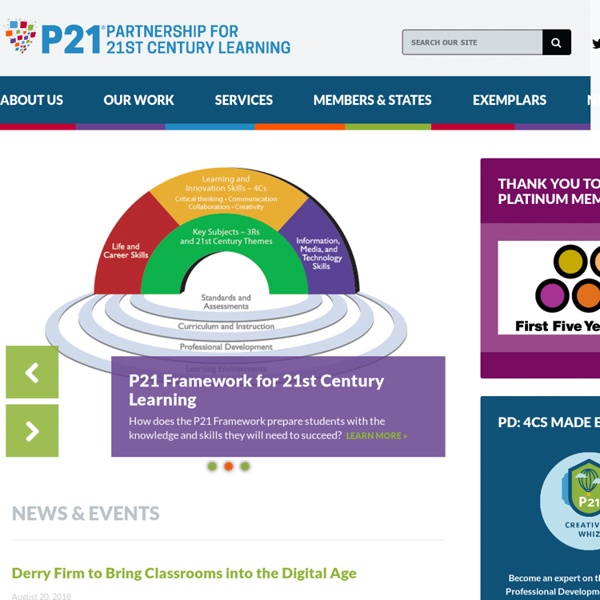



The 33 Digital Skills Every 21st Century Teacher should Have By EdTech Team Updated on march 2, 2015 : The original list that was created in 2011 comprised 33 skills , after reviewing it we decided to do some merging and finally ended up with the 20 skills below. The 21st century teacher should be able to : 1- Create and edit digital audio Here are some tools for teachers to develop this skill :Free Audio Tools for Teachers 2- Use Social bookmarking to share resources with and between learners Here are some tools for teachers to develop this skill : A List of Best Bookmarking Websites for Teachers
6 Texas Educational IT Professionals Tackle K–12 Tech Challenges in Roundtable In February, CDW•G sat down with six K–12 IT professionals and educators from four Texas school districts to discuss the role technology plays in teaching. Participants included: Lee Sleeper, Director of Operations and Technology (Bullard ISD)Amanda Goode, Curriculum Integration Specialist (Bullard ISD)Katie Russell, Director of Technology (Barbers Hill ISD)Alicia Brooks, Instructional Technologist (Barbers Hill ISD)Luann Hughes, Director of Technology (Temple ISD)Wendy Jones, Director of Technology, Curriculum and Innovation (Leander ISD) The roundtable discussion, held during the TCEA 2016 conference on educational technology, in Austin, Texas, was moderated by Chad Stevens, chief education strategist for CDW•G.
In 2012, the biggest changes on the Web were in online education, social networks, and the increasing use of smartphones and tablets. Live and learn: Everybody went mobile in 2012 (or so it seemed), but the most groundbreaking movement on the Web may have been the rise of digital education. For all the attention lavished on the Web’s growth on mobile devices this year, one of the most interesting Internet trends is still best experienced on a desktop computer: online education. The rising cost of higher education (the average bachelor’s degree now costs more than $100,000), combined with increasing access to high-speed Internet service and a desire for more efficient and flexible learning methods, brought new prominence to websites offering free or low-priced courses in everything from programming to literature. Free online code-learning startup Codecademy’s effort to teach novices to code snagged more than 400,000 participants for its weekly lessons in JavaScript, HTML, and CSS.
How Teaching Spatial Skills Could Be Part of a School’s Strategic Plan Spatial skills don’t get a lot of attention in K-12 education, despite research pointing to the link between spatial reasoning and academic achievement, creativity and the arts. So when Linda Swarlis first happened upon the research for herself, she had a revelation. “This was a game changer for me,” said Swarlis, director of information services at Columbus School for Girls, a PreK-12 school in Ohio. “I had never heard of the impact of spatial ability on engineering and mathematics success.”
Connectivism: A Learning Theory for the Digital Age Connectivism: A Learning Theory for the Digital Age December 12, 2004 George Siemens Update (April 5, 2005): I've added a website to explore this concept at www.connectivism.ca A Thematic Approach to Planning Your Maker Space When schools talk about the Maker Movement and creating maker spaces, they often focus their initial thinking on purchasing the tools and materials. This resource-driven approach can create a buzz in your school for some time; however, that excitement will inevitably fade. While resources are an important part of any maker space, taking a thematic planning approach is much more effective.
Why Learning Through Social Networks Is The Future by Paul Moss, edmerger.com Students Need Professional Learning Networks, Too Learning to create, manage and promote a professional learning network (PLN) will soon become, if it’s not already, one of the most necessary and sought after skills for a global citizen, and as such, must become a prominent feature of any school curriculum.
Five Critical Skills to Empower Students in the Digital Age The beginning of the school year is a time to set the tone for a student’s learning experience, including what teachers expect from students and families. But that first week of school is also the time to teach valuable learning skills that will be used throughout the year. Alan November, a former teacher turned lecturer, consultant and author, challenged teachers to rethink how they start the school year by outlining skills that are crucial to students to learn in the first five days of school. He shared his vision at the International Society for Technology in Education conference in Philadelphia. 1.